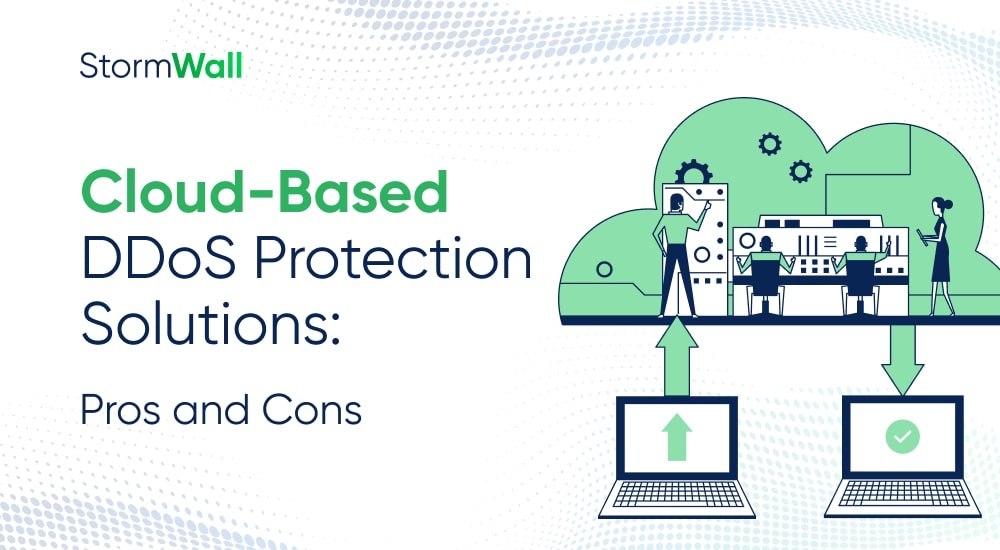Companies face an increasing challenge from DDoS attacks, which are growing in both frequency and sophistication. Effective defense strategies are crucial to maintaining service availability. Many organizations choose cloud-based anti-DDoS solutions for their flexibility, quick setup, and cost advantages. However, are these solutions the right fit for every company? This article examines their strengths and weaknesses, providing IT and cybersecurity professionals with insights for making informed decisions.

Overview of DDoS Protection Solutions
There are three primary types of DDoS protection:
- On-premises solutions—hardware and software deployed within the company’s infrastructure.
- Cloud-based solutions—services provided by third-party cloud providers.
- Hybrid solutions—a combination of both, balancing on-premises control with cloud scalability.
Cloud-based solutions are gaining popularity due to their affordability and flexibility. A lot of companies prefer them over expensive hardware-based alternatives, especially as DDoS attacks become more sophisticated.
Cloud DDoS Mitigation Explained
Cloud-based DDoS protection services filter malicious traffic before it reaches an organization’s network. These solutions operate through global scrubbing centers, ensuring real-time threat mitigation. Unlike on-premises systems, cloud-based services require no hardware investments and often include added benefits such as technical support and automatic updates.
Advantages of Cloud-Based Solutions
Cloud-based anti-DDoS solutions offer a range of benefits that make them a preferred choice for many companies. These advantages include:
- Comprehensive protection—safeguards against volumetric, protocol, and application-layer (L7) attacks, ensuring uninterrupted service availability even during complex multi-vector attacks.
- Rapid deployment with no upfront costs—unlike on-premises hardware, which requires procurement, installation, and maintenance, cloud-based solutions can be activated within minutes. Companies pay a predictable monthly fee, avoiding large initial investments.
- High filtering capacity and scalability—leading cloud DDoS mitigation providers offer massive filtering capacities, often exceeding terabits per second. Scaling protection is as simple as upgrading a service plan or contacting the provider.
- Expert cybersecurity support—cloud providers employ dedicated cybersecurity teams that monitor threats and fine-tune filtering systems, which is especially valuable for companies without in-house security specialists.
- Assistance with migration—for companies transitioning from legacy systems, cloud providers often offer seamless migration support, minimizing downtime and integration challenges.
- 24/7 technical support—cloud services typically include round-the-clock support, ensuring that companies receive immediate assistance during attacks.
- High availability and reliability—service-level agreements (SLAs) for cloud-based solutions often guarantee uptime exceeding 99%, ensuring business continuity.
Disadvantages of Cloud-Based Solutions
While cloud-based anti-DDoS solutions offer many benefits, there are also some challenges companies should consider:
- Potential latency in traffic filtering—because traffic is routed through cloud-based scrubbing centers, slight delays can occur. On-premises solutions may offer faster filtering speeds for latency-sensitive applications.
- Shared responsibility model—with cloud solutions, security responsibilities are divided between the company and the provider. While providers secure their infrastructure, organizations must ensure proper security configurations on their end.
Wrapping up
For most companies, the advantages of cloud-based anti-DDoS protection far outweigh the drawbacks. The combination of affordability, scalability, and expert support makes these solutions an attractive option. Given the growing demand, companies that have not yet adopted cloud-based protection should consider testing it. Many providers, including StormWall, offer free demo access, allowing companies to evaluate performance before making a commitment.
By leveraging cloud-based DDoS mitigation, organizations can strengthen their cybersecurity posture while ensuring seamless operations in an increasingly hostile digital landscape.

DDoS Protection for Websites
- Activate protection in 10 minutes
- 24/7 technical support




















